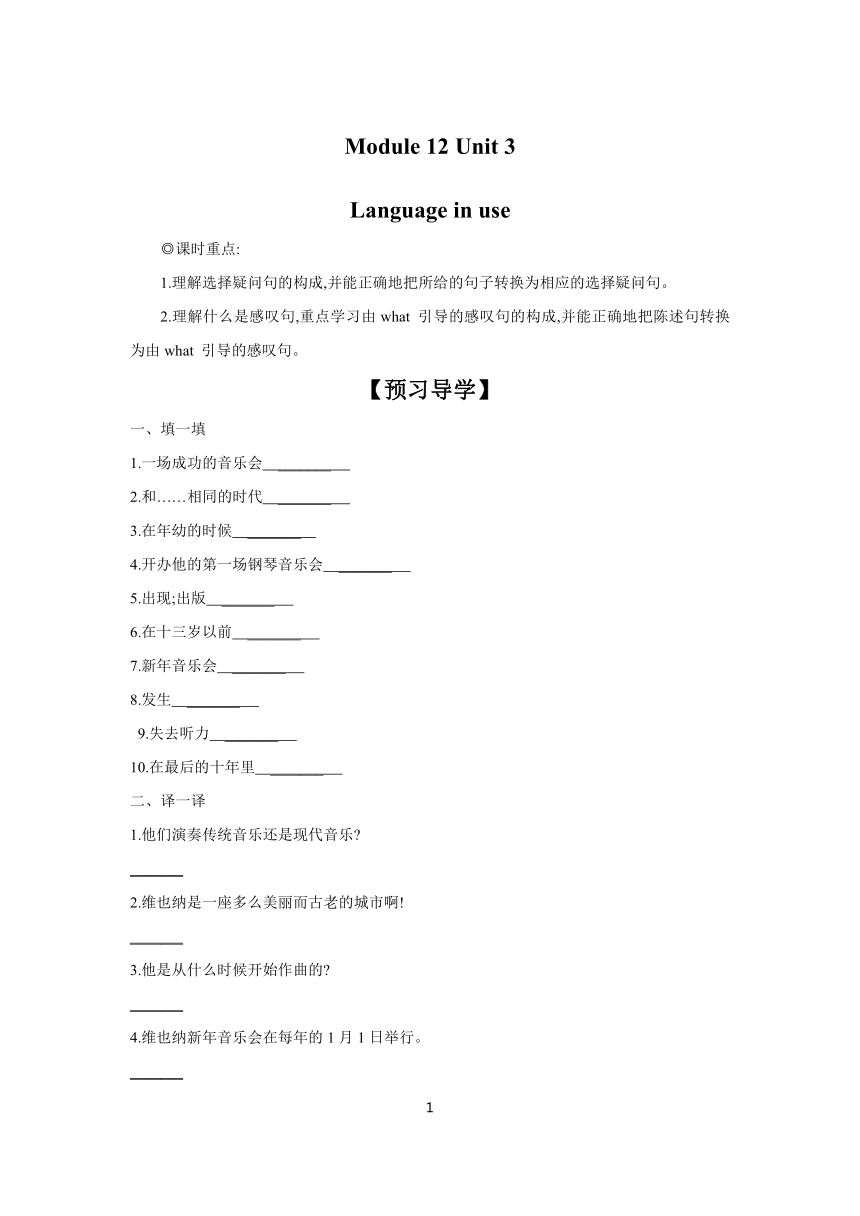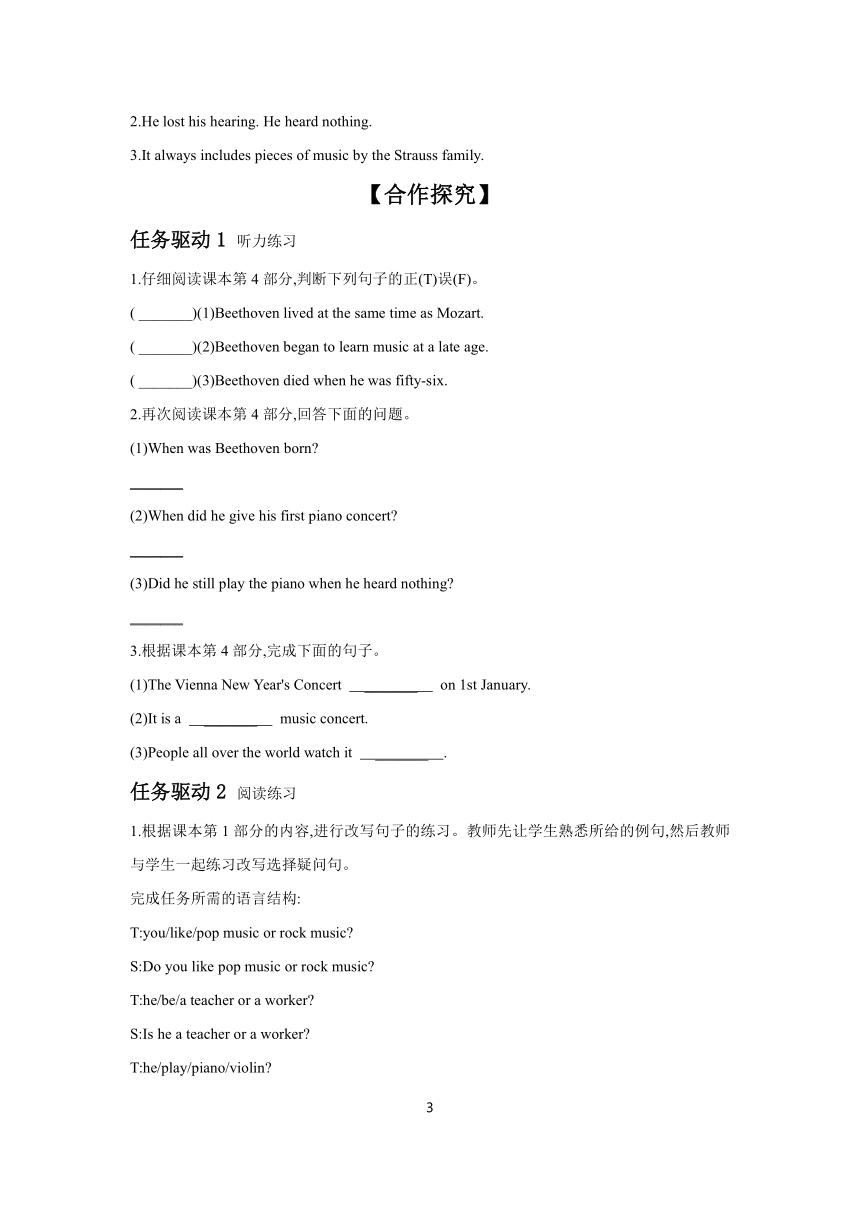Module 12 Western music Unit 3 学案 2023-2024学年初中英语外研版七年级下册(含答案)
文档属性
| 名称 | Module 12 Western music Unit 3 学案 2023-2024学年初中英语外研版七年级下册(含答案) |

|
|
| 格式 | docx | ||
| 文件大小 | 25.2KB | ||
| 资源类型 | 教案 | ||
| 版本资源 | 外研版 | ||
| 科目 | 英语 | ||
| 更新时间 | 2024-02-20 23:26:47 | ||
图片预览



文档简介
Module 12 Unit 3
Language in use
◎课时重点:
1.理解选择疑问句的构成,并能正确地把所给的句子转换为相应的选择疑问句。
2.理解什么是感叹句,重点学习由what 引导的感叹句的构成,并能正确地把陈述句转换为由what 引导的感叹句。
【预习导学】
一、填一填
1.一场成功的音乐会 _______
2.和……相同的时代 _______
3.在年幼的时候 _______
4.开办他的第一场钢琴音乐会 _______
5.出现;出版 _______
6.在十三岁以前 _______
7.新年音乐会 _______
8.发生 _______
9.失去听力 _______
10.在最后的十年里 _______
二、译一译
1.他们演奏传统音乐还是现代音乐
_______
2.维也纳是一座多么美丽而古老的城市啊!
_______
3.他是从什么时候开始作曲的
_______
4.维也纳新年音乐会在每年的1月1日举行。
_______
5.全世界的人在电视上观看它,欣赏音乐。
_______
三、想一想
1.Do you like traditional Western music or pop music
_______
2.What happened to Beethoven in the last ten years of his life
_______
3.What does the Vienna New Year's Concert always include
_______
【答案】预习导学
一、
1.a successful concert
2.at the same time as...
3.at an early age
4.give his first piano concert
5.come out
6.before the age of thirteen
7.New Year's Concert
8.take place
9.lose one's hearing
10.in the last ten years
二、
1.Do they play traditional music or modern music
2.What a beautiful old city Vienna is!
3.When did he start to write music
4.Every year, the Vienna New Year's Concert takes place on 1st January.
5.People all over the world watch it on TV and enjoy the music.
三、
1.I like pop music.
2.He lost his hearing. He heard nothing.
3.It always includes pieces of music by the Strauss family.
【合作探究】
任务驱动1 听力练习
1.仔细阅读课本第4部分,判断下列句子的正(T)误(F)。
( _______)(1)Beethoven lived at the same time as Mozart.
( _______)(2)Beethoven began to learn music at a late age.
( _______)(3)Beethoven died when he was fifty-six.
2.再次阅读课本第4部分,回答下面的问题。
(1)When was Beethoven born
_______
(2)When did he give his first piano concert
_______
(3)Did he still play the piano when he heard nothing
_______
3.根据课本第4部分,完成下面的句子。
(1)The Vienna New Year's Concert _______ on 1st January.
(2)It is a _______ music concert.
(3)People all over the world watch it _______ .
任务驱动2 阅读练习
1.根据课本第1部分的内容,进行改写句子的练习。教师先让学生熟悉所给的例句,然后教师与学生一起练习改写选择疑问句。
完成任务所需的语言结构:
T:you/like/pop music or rock music
S:Do you like pop music or rock music
T:he/be/a teacher or a worker
S:Is he a teacher or a worker
T:he/play/piano/violin
S:Does he play the piano or the violin
...
师生练习完后再让生生练习。
完成任务所需的语言结构:
S1:Do you like pop music or rock music
S2:I like pop music.
S1:Is he a teacher or a worker
S2:He is a teacher.
S1:Does he play the piano or the violin
S2:He plays the piano.
...
2.根据你的个人情况,回答下面的问题。
(1)Do you like English or math
(2)Is your mother a worker or a doctor
(3)Do you feel happy or sad today
任务驱动3 对话练习
1.以小组的形式选出正确的问答语,并进行问答练习。教师将全班分为A、B两个小组,对本单元学过的内容进行问答练习。
Group A:
(1)Do you like Beethoven's music
(2)When did Beethoven start to write music
(3)When did Beethoven's first work come out
(4)Did Beethoven lose his hearing
(5)When did Beethoven hear nothing
Group B:
a:Yes, I do.
b:Very early.
c:Before the age of thirteen.
d:Yes, he did.
e:In the last ten years of his life.
2.听录音,进行朗读练习。
【答案】合作探究
任务驱动一 听力练习
1.(1)T (2)F (3)T
2.(1)He was born in 1770.
(2)When he was only seven.
(3)Yes, he did.
3.(1)takes place
(2)classical
(3)on TV
任务驱动三 对话练习
【知识超市】
●What beautiful music this is! 这是多么优美的音乐啊!
感叹句用来表示说话人强烈的喜、怒、哀、乐等情绪,用how 和what 引导,how和what 所修饰的词放在其后,其他部分用陈述语序。在口语中谓语常省略,句末使用感叹号。
1.what 引导的感叹句:
(1)What + a/an +形容词+单数可数名词+陈述句(主语+谓语)!例如:
What a clean city it is!这是一个多么干净的城市啊!
(2)What +形容词+复数可数名词/不可数名词+陈述句(主语+谓语)!例如:
What beautiful pictures (they are)!(他们是)多么漂亮的图片啊!
What bad weather (it is)!多么糟糕的天气!
2.how 引导的感叹句:
How +形容词/副词+陈述句(主语+谓语)!例如:
How carefully he writes!他写得多么认真啊!
How +陈述句(主语+谓语)!例如:
How I miss you!我多么想念你!
How +形容词+(a/an +单数可数名词)+陈述句(主语+谓语)!例如:
How hot the weather is!天气多么热啊!
做一做:单项选择。
( _______)1. wonderful movie! We like it very much.
A.What B.What a
C.How D.How a
( _______)2. beautiful flowers they are!
A.How B.What
C.What a D.How a
●But he began to lose his hearing.但是他开始失去听力。
begin意为“开始”,begin to do sth.意为“开始做某事”,也可表达为“begin doing sth.”;begin 的同义单词是start,用法相同。
hearing意为“听力”,它是hear的名词形式。lose one's hearing意为“失去听力”。
动词hear的用法:hear sb. do sth.意为“听到某人做/做过某事”,hear sb. doing sth.意为“听到某人正在做某事”。
做一做:单项选择。
( _______)1.He began English at the age of ten.
A.to learn B.learn
C.learned D.to learning
( _______)2.I often hear him in the morning.
A.singing B.sing
C.sings D.to sing
【答案】
知识超市
做一做:
1.B 2.B
做一做:
1.A 2.B
2
Language in use
◎课时重点:
1.理解选择疑问句的构成,并能正确地把所给的句子转换为相应的选择疑问句。
2.理解什么是感叹句,重点学习由what 引导的感叹句的构成,并能正确地把陈述句转换为由what 引导的感叹句。
【预习导学】
一、填一填
1.一场成功的音乐会 _______
2.和……相同的时代 _______
3.在年幼的时候 _______
4.开办他的第一场钢琴音乐会 _______
5.出现;出版 _______
6.在十三岁以前 _______
7.新年音乐会 _______
8.发生 _______
9.失去听力 _______
10.在最后的十年里 _______
二、译一译
1.他们演奏传统音乐还是现代音乐
_______
2.维也纳是一座多么美丽而古老的城市啊!
_______
3.他是从什么时候开始作曲的
_______
4.维也纳新年音乐会在每年的1月1日举行。
_______
5.全世界的人在电视上观看它,欣赏音乐。
_______
三、想一想
1.Do you like traditional Western music or pop music
_______
2.What happened to Beethoven in the last ten years of his life
_______
3.What does the Vienna New Year's Concert always include
_______
【答案】预习导学
一、
1.a successful concert
2.at the same time as...
3.at an early age
4.give his first piano concert
5.come out
6.before the age of thirteen
7.New Year's Concert
8.take place
9.lose one's hearing
10.in the last ten years
二、
1.Do they play traditional music or modern music
2.What a beautiful old city Vienna is!
3.When did he start to write music
4.Every year, the Vienna New Year's Concert takes place on 1st January.
5.People all over the world watch it on TV and enjoy the music.
三、
1.I like pop music.
2.He lost his hearing. He heard nothing.
3.It always includes pieces of music by the Strauss family.
【合作探究】
任务驱动1 听力练习
1.仔细阅读课本第4部分,判断下列句子的正(T)误(F)。
( _______)(1)Beethoven lived at the same time as Mozart.
( _______)(2)Beethoven began to learn music at a late age.
( _______)(3)Beethoven died when he was fifty-six.
2.再次阅读课本第4部分,回答下面的问题。
(1)When was Beethoven born
_______
(2)When did he give his first piano concert
_______
(3)Did he still play the piano when he heard nothing
_______
3.根据课本第4部分,完成下面的句子。
(1)The Vienna New Year's Concert _______ on 1st January.
(2)It is a _______ music concert.
(3)People all over the world watch it _______ .
任务驱动2 阅读练习
1.根据课本第1部分的内容,进行改写句子的练习。教师先让学生熟悉所给的例句,然后教师与学生一起练习改写选择疑问句。
完成任务所需的语言结构:
T:you/like/pop music or rock music
S:Do you like pop music or rock music
T:he/be/a teacher or a worker
S:Is he a teacher or a worker
T:he/play/piano/violin
S:Does he play the piano or the violin
...
师生练习完后再让生生练习。
完成任务所需的语言结构:
S1:Do you like pop music or rock music
S2:I like pop music.
S1:Is he a teacher or a worker
S2:He is a teacher.
S1:Does he play the piano or the violin
S2:He plays the piano.
...
2.根据你的个人情况,回答下面的问题。
(1)Do you like English or math
(2)Is your mother a worker or a doctor
(3)Do you feel happy or sad today
任务驱动3 对话练习
1.以小组的形式选出正确的问答语,并进行问答练习。教师将全班分为A、B两个小组,对本单元学过的内容进行问答练习。
Group A:
(1)Do you like Beethoven's music
(2)When did Beethoven start to write music
(3)When did Beethoven's first work come out
(4)Did Beethoven lose his hearing
(5)When did Beethoven hear nothing
Group B:
a:Yes, I do.
b:Very early.
c:Before the age of thirteen.
d:Yes, he did.
e:In the last ten years of his life.
2.听录音,进行朗读练习。
【答案】合作探究
任务驱动一 听力练习
1.(1)T (2)F (3)T
2.(1)He was born in 1770.
(2)When he was only seven.
(3)Yes, he did.
3.(1)takes place
(2)classical
(3)on TV
任务驱动三 对话练习
【知识超市】
●What beautiful music this is! 这是多么优美的音乐啊!
感叹句用来表示说话人强烈的喜、怒、哀、乐等情绪,用how 和what 引导,how和what 所修饰的词放在其后,其他部分用陈述语序。在口语中谓语常省略,句末使用感叹号。
1.what 引导的感叹句:
(1)What + a/an +形容词+单数可数名词+陈述句(主语+谓语)!例如:
What a clean city it is!这是一个多么干净的城市啊!
(2)What +形容词+复数可数名词/不可数名词+陈述句(主语+谓语)!例如:
What beautiful pictures (they are)!(他们是)多么漂亮的图片啊!
What bad weather (it is)!多么糟糕的天气!
2.how 引导的感叹句:
How +形容词/副词+陈述句(主语+谓语)!例如:
How carefully he writes!他写得多么认真啊!
How +陈述句(主语+谓语)!例如:
How I miss you!我多么想念你!
How +形容词+(a/an +单数可数名词)+陈述句(主语+谓语)!例如:
How hot the weather is!天气多么热啊!
做一做:单项选择。
( _______)1. wonderful movie! We like it very much.
A.What B.What a
C.How D.How a
( _______)2. beautiful flowers they are!
A.How B.What
C.What a D.How a
●But he began to lose his hearing.但是他开始失去听力。
begin意为“开始”,begin to do sth.意为“开始做某事”,也可表达为“begin doing sth.”;begin 的同义单词是start,用法相同。
hearing意为“听力”,它是hear的名词形式。lose one's hearing意为“失去听力”。
动词hear的用法:hear sb. do sth.意为“听到某人做/做过某事”,hear sb. doing sth.意为“听到某人正在做某事”。
做一做:单项选择。
( _______)1.He began English at the age of ten.
A.to learn B.learn
C.learned D.to learning
( _______)2.I often hear him in the morning.
A.singing B.sing
C.sings D.to sing
【答案】
知识超市
做一做:
1.B 2.B
做一做:
1.A 2.B
2
同课章节目录
- Module 1 Lost and found
- Unit 1 Whose bag is this?
- Unit 2 Are they yours?
- Unit 3 Language in use
- Module 2 What can you do ?
- Unit 1 I can play the piano
- Unit 2 I can run really fast
- Unit 3 Language in use
- Module 3 Making plans
- Unit 1 What are you going to do at the weekends?
- Unit 2 We're going to cheer the players.
- Unit 3 Language in use
- Module 4 Life in the future
- Unit 1 Everyone will study at home
- Unit 2 Every family will have a small plane.
- Unit 3 Language in use
- Module 5 Shopping
- Unit 1 What can I do for you?
- Unit 2 You can buy everything on the Internet
- Unit 3 Language in use
- Module 6 Around town
- Unit 1 Could you tell me how to get to the Nationa
- Unit 2 The London Eye is on your right.
- Unit 3 Language in use
- Revision module A
- Module 7 My past life
- Unit 1 I was born in a small village.
- Unit 2 I was born in Quincy.
- Unit 3 Language in use
- Module 8 Story time
- Unit 1 Once upon a time….
- Unit 2 Goldilocks hurried out of the house.
- Unit 3 Language in use
- Module 9 Life history
- Unit 1 He left school and began work at the age of
- Unit 2 He decided to be an actor.
- Unit 3 Language in use
- Module 10 A holiday journey
- Unit 1 What did you do?
- Unit 2 This morning we took a walk.
- Unit 3 Language in use
- Module 11 Body language
- Unit 1 They touch noses!
- Unit 2 Here are some ways to welcome them.
- Unit 3 Language in use
- Module 12 Western music
- Unit 1 It's so beautiful!
- Unit 2 Vienna is the centre of European classical
- Unit 3 Language in use
- Revision module B
